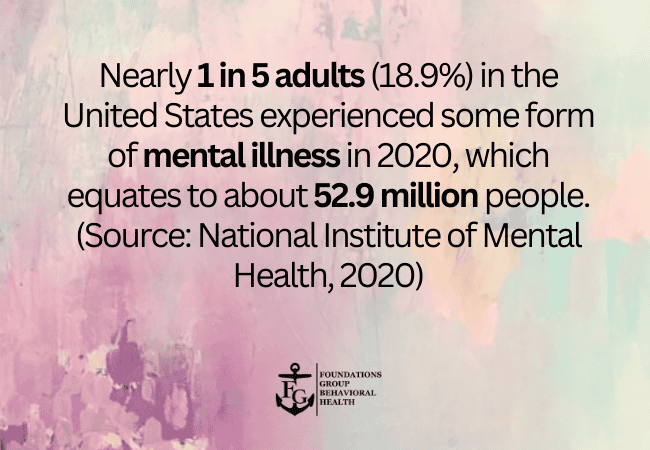Mental illness is a prevalent and complex issue that affects individuals of all ages, backgrounds, and walks of life. At Foundations Group Behavioral Health, we understand the importance of identifying and addressing the underlying causes of mental illness. The origins of mental health disorders are multifactorial, meaning that they arise from a combination of genetic, environmental, psychological, and biological factors. In this post, we will delve deeper into these causes and explore how Foundations Group Behavioral Health provides effective treatment options through various programs like Psychiatric Day Treatment, Half Day Treatment Program, and specialized Anxiety Treatment Program, among others.
Genetic Factors: The Blueprint of Mental Health
One of the key factors in the development of mental illness is genetics. Mental health conditions often run in families, suggesting that hereditary factors play a critical role in their onset. If you have a family member who has been diagnosed with a mental health disorder such as bipolar disorder, schizophrenia, or major depressive disorder, your risk of experiencing similar conditions increases. However, while genetics contribute to a person’s vulnerability, they do not guarantee the development of mental illness. Environmental and lifestyle factors also influence how genes are expressed.
At Foundations Group Behavioral Health, we take a personalized approach to treatment. For individuals with a genetic predisposition to mental health conditions, we offer comprehensive care through our Outpatient Mental Health Program, which includes both therapy and medication management tailored to the individual’s needs.
Environmental and Social Stressors: Impact of Life Experiences
In addition to genetics, environmental and social factors play a significant role in the development of mental illness. Traumatic experiences, such as childhood abuse, neglect, or the loss of a loved one, can have profound and lasting effects on mental health. These events can lead to the development of Post-Traumatic Stress Disorder (PTSD), anxiety disorders, or depression. Similarly, ongoing stressors such as work pressure, financial struggles, or relationship issues can trigger mental health issues in individuals who may have a genetic vulnerability.
At Foundations Group Behavioral Health, we offer specialized programs to address these challenges, such as our Trauma Disorder Treatment Program. This program focuses on helping individuals process and heal from past traumatic experiences using evidence-based therapies such as Cognitive Behavioral Therapy (CBT) and Eye Movement Desensitization and Reprocessing (EMDR). These therapies are proven to reduce the impact of trauma and promote healing in a supportive and compassionate environment.
Genetic Factors: Inherited Risks and Mental Health
Genetics play a significant role in shaping our mental health. Research has shown that mental health conditions such as depression, bipolar disorder, schizophrenia, and anxiety disorders often run in families, suggesting that genetics contribute to their development. This means that individuals with a family history of mental illness may have a higher likelihood of experiencing similar conditions themselves. However, it’s important to note that genetics alone do not determine whether someone will develop a mental health disorder. Environmental factors, lifestyle, and personal experiences all interact with genetic predispositions to influence mental health outcomes.
For example, a person who has a family member diagnosed with schizophrenia may have a higher risk, but this doesn’t mean they will definitely develop the disorder. Environmental stressors such as trauma or significant life changes can trigger the onset of symptoms. This is why understanding genetic predisposition, combined with other factors, is vital in determining a treatment plan.
At Foundations Group Behavioral Health, we take a personalized approach to care, especially for individuals with a genetic vulnerability to mental health issues. Our Outpatient Mental Health Program and Co-Occurring Disorder Treatment Program offer comprehensive treatment plans that integrate therapy and medication management. This holistic approach can help manage the effects of genetic predisposition and address any co-occurring mental health concerns that may arise.

Environmental and Social Influences: How Life Events Shape Mental Health
While genetics provide a foundational blueprint, environmental and social influences often act as catalysts, shaping the mental health of an individual throughout their life. Traumatic life events such as abuse, the loss of a loved one, bullying, and even chronic stress can trigger or exacerbate mental health conditions. These experiences may lead to disorders such as Post-Traumatic Stress Disorder (PTSD), depression, anxiety, and other mood disorders. The impact of these events can be particularly profound during childhood, as early adverse experiences can disrupt emotional development and lead to difficulties later in life.
Social isolation, financial stress, work-related pressure, and strained relationships are additional factors that can negatively affect mental well-being. Ongoing stress from these sources can make it harder for individuals to manage their emotions and cope with everyday challenges, further increasing the risk of mental health issues.
At Foundations Group Behavioral Health, we understand the importance of addressing these external factors in treatment. Our Trauma Disorder Treatment Program offers a safe, supportive environment where individuals can work through past traumatic experiences using evidence-based therapies. This program focuses on helping patients process their trauma, build healthy coping mechanisms, and develop emotional resilience. Whether someone is dealing with past trauma or ongoing stressors, our team is committed to providing the care and support needed to heal and move forward.
Neurochemical Imbalances: The Brain’s Chemical Signals
An often overlooked yet critical factor in the development of mental illness is the neurochemical imbalance in the brain. Neurotransmitters, which are chemicals that transmit signals in the brain, play a central role in regulating mood, cognition, and behavior. Imbalances in neurotransmitters such as serotonin, dopamine, and norepinephrine are linked to various mental health disorders, including depression, anxiety, and schizophrenia.
For example, individuals with depression often experience lower levels of serotonin and norepinephrine, while those with bipolar disorder may experience extreme fluctuations in dopamine levels. Neurochemical imbalances can be exacerbated by stress, substance use, or other environmental factors.
At Foundations Group Behavioral Health, we understand the impact of these imbalances and offer treatments designed to address them. Our Anxiety Treatment Program and Depressive Disorder Treatment Program utilize a combination of psychotherapy and medication management to regulate neurotransmitter levels and provide relief from symptoms. Our Psychiatric Day Treatment and Half Day Treatment Program offer flexible options for those seeking intensive care in an outpatient setting, allowing patients to maintain their daily routines while receiving the treatment they need.
Psychological and Cognitive Factors: Coping with Mental Health Challenges
Psychological factors, including individual personality traits, coping mechanisms, and early life experiences, also contribute to mental illness. For instance, individuals who struggle with low self-esteem or negative thinking patterns may be more vulnerable to developing mental health conditions. In addition, those who experience chronic stress without healthy coping strategies may find themselves more susceptible to anxiety, depression, or even sleep disorders.
At Foundations Group Behavioral Health, we emphasize the importance of building healthy coping mechanisms and reshaping unhelpful thought patterns. Our Behavioral Health Treatment Center Massachusetts offers a variety of therapy programs, including Dialectical Behavioral Therapy (DBT) and Cognitive Behavioral Therapy (CBT), which are designed to help patients develop more adaptive ways of thinking, feeling, and behaving. These therapies are highly effective in treating co-occurring disorders, where mental health and substance use disorders overlap, as they target both thought processes and behaviors that contribute to distress.
Sleep Disorders and Mental Health: The Intricate Connection
Sleep disorders are often closely tied to mental health, as poor sleep can worsen the symptoms of mental illnesses, and mental health issues can lead to sleep disturbances. Conditions such as insomnia, sleep apnea, and narcolepsy can significantly impair an individual’s ability to function and contribute to a variety of mental health conditions, including anxiety and depression.
At Foundations Group Behavioral Health, we recognize the crucial link between sleep and mental health. Our Sleep Disorder Treatment Program is designed to help individuals overcome sleep disturbances through behavioral interventions, education, and, when necessary, medication management. This comprehensive approach can improve both sleep quality and overall mental health.
The Role of Treatment in Addressing the Causes of Mental Illness
While the causes of mental illness are complex and varied, the good news is that mental health disorders are treatable. At Foundations Group Behavioral Health, we are dedicated to providing personalized care to help individuals manage and overcome the challenges they face. Our Co-Occurring Disorder Treatment Program helps individuals struggling with both mental health and substance use disorders to achieve long-term recovery.
We offer multiple treatment modalities, including individual therapy, group therapy, and medication management, to address the unique needs of each patient. Whether you are dealing with anxiety, depression, sleep disorders, or trauma, our team of experienced professionals is here to support you on your journey to healing and recovery.
Conclusion
The causes of mental illness are multifactorial and involve a combination of genetic, environmental, psychological, and neurochemical factors. At Foundations Group Behavioral Health, we are committed to providing effective and personalized treatment that addresses these root causes. Through our Psychiatric Day Treatment, Half Day Treatment Program, and specialized programs such as the Anxiety Treatment Program, Depressive Disorder Treatment Program, and Trauma Disorder Treatment Program, we offer comprehensive care that helps individuals manage and overcome mental health challenges. Contact us today at 508.388.5324 to book your first session and begin your journey toward a more mindful future.
FAQ on What Causes Mental Illness?
What are the primary causes of mental illness?
Mental illness can arise from a combination of genetic, environmental, and neurobiological factors. Genetics can predispose individuals to certain conditions, while life experiences such as trauma and stress can trigger or worsen symptoms. Neurochemical imbalances in the brain also play a significant role in conditions like depression and anxiety.
Can mental illness be inherited?
Yes, mental health disorders like depression, schizophrenia, and bipolar disorder often have a genetic component. If a family member has a mental health condition, there may be a higher risk of developing the same or similar conditions. However, genetics alone don’t determine whether someone will develop a mental illness; environmental and lifestyle factors also play an essential role.
How do environmental factors influence mental health?
Environmental factors, such as childhood trauma, stressful life events, social isolation, and ongoing life pressures, can contribute to the development of mental health disorders. For example, exposure to trauma or chronic stress can lead to anxiety, depression, or PTSD. Supportive relationships and a stable environment, on the other hand, can help mitigate these effects.
Can brain chemistry affect mental health?
Yes, neurochemical imbalances in the brain are a common cause of mental health disorders. Neurotransmitters like serotonin, dopamine, and norepinephrine help regulate mood, emotions, and cognition. When these chemicals are out of balance, it can lead to conditions such as depression, anxiety, and bipolar disorder.








